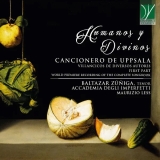 Humanos y Divinos: Cancionero de Upsala, Villancicos de diversos autores; Accademia degli Imperfetti; 1 CD Da Vinci Classics C00442; Aufnahme 06.2020, Veröffentlichung 07.2021 (55'17) – Rezension von Remy Franck
Humanos y Divinos: Cancionero de Upsala, Villancicos de diversos autores; Accademia degli Imperfetti; 1 CD Da Vinci Classics C00442; Aufnahme 06.2020, Veröffentlichung 07.2021 (55'17) – Rezension von Remy Franck
Das Ensemble L’Accademia degli Imperfetti (bestehend aus Baltazar Zuniga, Tenor, Giorgia Less, Maurizio Less, Viola da Gamba, Marinella Di Fazio, Vihuela de mano, Matteo Rabolini, Schlagzeug) präsentiert mit Humanos y Divinos eine Anthologie von sowohl geistlichen als auch profanen Villancicos, die 1556 in Venedig veröffentlicht und 1906 in Uppsala gefunden wurde, wo sie den Namen Cancionero del Duca di Calabria erhielt. Die Anthologie begreift in der Tat Stücke, die am valencianischen Hof von Ferdinand von Aragon, dem Herzog von Kalabrien und späteren Vizekönig von Valencia, im zweiten Viertel des 16. Jahrhunderts aufgeführt wurden.
Im Programm kommt neben der Viola da Gamba und diversen Schlagzeuginstrumenten die auf der Iberischen Halbinsel beliebte, gezupfte Vihuela de mano zum Einsatz. Aufgrund ihres geringen Preises war sie in Spanien das populärste aller Musikinstrumente.
Das Ensemble führt die rein instrumentalen und die vokalen Kompositionen in feinem Stil auf, der sowohl das sinnliche wie das repräsentative Element der Kompositionen hervorzuheben weiß. Es ist also genug Wandlungspotential für die vielen verschiedenen Seiten der Sammlung vorhanden.
Mit seinem betont unartifiziellen, aber immer einfühlsamen Vortrag ist der mexikanische Tenor Baltazar Zuniga eine tragende Säule des Ganzen.
Obwohl man bedauern kann, dass das Textheft die gesungenen Texte nicht enthält, ist dies eine in jeglicher Hinsicht dankenswerte Veröffentlichung.
The ensemble L’Accademia degli Imperfetti (composed of Baltazar Zuniga, tenor, Giorgia Less, Maurizio Less, viola da gamba, Marinella Di Fazio, vihuela de mano, Matteo Rabolini, percussion) presents Humanos y Divinos, an anthology of both sacred and profane villancicos published in Venice in 1556 and found in Uppsala in 1906, where it was named Cancionero del Duca di Calabria. The anthology in fact comprehends pieces performed at the Valencian court of Ferdinand of Aragon, Duke of Calabria and later Viceroy of Valencia, in the second quarter of the 16th century.
In the program, in addition to the viola da gamba and various percussion instruments, the plucked vihuela de mano, popular in the Iberian Peninsula, is used. Due to its low price, it was the most popular of all musical instruments in Spain.
The ensemble performs the purely instrumental and the vocal compositions in a fine style that knows how to emphasize both the sensual and the representative element of the compositions. So there is enough transformative potential for the many different sides of the collection.
With his inartificial but always sensitive performance, Mexican tenor Baltazar Zuniga is a pillar of the whole performances.
Although one may regret that the booklet does not include the sung texts, this is a great release in every respect.






















